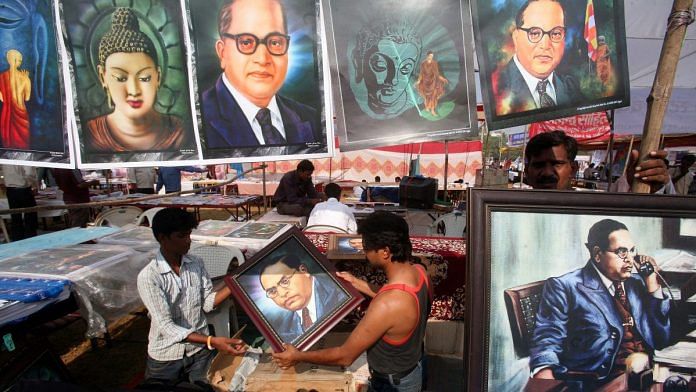The damage done to social justice is double-fold, because the court has misused Ambedkar’s name and legacy to virtually weaken and disempower a legislation that is aimed at protecting the marginalised communities.
A bench of two judges of the Supreme Court delivered a massive blow to the idea of social justice. And the shocking irony is they have done it by quoting B.R. Ambedkar.
With its judgment in Dr Subhash Kashinath Mahajan v State of Maharashtra (dated 20 March), the bench, comprising justices A.K. Goel and U.U. Lalit, has diluted the provisions of the Scheduled Castes and the Scheduled Tribes (Prevention of Atrocities) Act, 1989 (SC/ST Act), thereby rendering it ineffective. The key provision of the SC/ST Act was denial of anticipatory bail — and that has now been watered down. The judgment further restricts the registration of FIR and possible arrests of people accused under the Act.
Shockingly, the bench has interpreted the implementation of the SC/ST Act as “perpetuating casteism”, calling it an adversary of “constitutional values”.
The most ironic part of the judgment is that the bench has limited the scope of the SC/ST Act by quoting an excerpt on ‘fraternity’ from the final address of Ambedkar, which he made to the Constituent Assembly on 25 November 1949. Diluting the Act, the SC called the judgment a promotion of fraternity.
Ambedkar recognised fraternity as a necessary principle for the survival of Indian democracy. But what did he mean by fraternity? He defined it as the “common brotherhood of all Indians”. In his revolutionary, yet undelivered, speech titled ‘Annihilation of Caste’, he described fraternity as “essentially an attitude of respect and reverence towards fellow men”. His notion of fraternity also finds expression in the preamble of the Constitution, which assures ‘dignity of the individual’ and ‘unity and integrity of the nation’.
Ambedkar perceived the caste system to be violative of individual dignity. He said casteism was “anti-national” and contrary to the country’s unity and integrity, and described it as bringing “separation in social life”. Fraternity, by protecting individual dignity under our constitutional scheme, is, therefore, a process to annihilate the caste oppression prevalent in our society.
If the judges of the Supreme Court had made an effort to actually read Ambedkar’s address before quoting it, they would have found that he had warned, in clear terms, about the “monopoly of a few” in our society, which deprived the downtrodden lower castes of their chances of a better life. By preserving and promoting fraternity, Ambedkar meant, the monopoly of the higher castes in society would be eliminated. Fraternity requires that all citizens imbibe the shared values of the Constitution and do not discriminate or oppress other citizens.
The bench failed to look beyond its myopic lenses and ignored the fact that SC/ST people have been the victims of the caste system, not the higher castes. They face suppression and social boycott by the higher castes, and not vice versa.
This spirit of social justice runs through the entire Constitution because of Ambedkar’s work. It was for this reason that special provisions, in the form of Articles 15(2), 17 and 23, protecting rights of the marginalised and to help them enter the mainstream, were incorporated explicitly into the Constitution.
The SC/ST Act was passed as a supplement to our constitutional objective of eradicating the oppression of the SC/STs embedded in the caste system. It is meant to protect them from indignities, humiliations and harassment, and promote fraternity.
By diluting the SC/ST Act, the judgment of the Supreme Court has, in effect, shattered the self-respect and esteem of the community. The damage done to social justice is double-fold, because the court has misused Ambedkar’s name and legacy to weaken and disempower a legislation that is aimed at protecting the marginalised communities.
Anurag Bhaskar is a law graduate from Dr Ram Manohar Lohiya National Law University, Lucknow. He tweets at @anuragbhaskar_




Sc done a fine job. 70 years of independence. You cannot have discrimination in reverse. Caste n minorities politics will break India. As of now ashamed to be Indian.
Wonderful work by sc get rid of discrimination
The writer of this article is paranoid and preconceived. He failed to see the plight of persons haressed by this special law and circumstances compelled to take such decision by the hon’ble court. At present you can not expect from political dispensation to take such decision. It is high time to introduce creamy layer system in the reservation to SC &ST also to provide the benefits to real needy people.
Diluting a law is also not a solution to the ongoing misuse of the law. Domestic laws in that sense are the most misused laws and if the SC will dilute them too, I don’t think it will be a good idea.
Moreover at this progressing age of India where Dalits are killed just for carrying their baraat from the Thakurs colony, the decision would do no good.